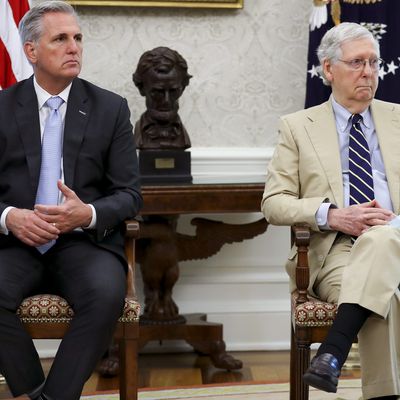
Given the extraordinary importance of partisan polarization in Washington and elsewhere, it’s sometimes easy to forget there are tensions between members of the House and Senate that cross party lines. To put this bipartisan angst simply: Senators tend to view House members as noisy, narrow-minded lilliputians, while House members tend to view senators as self-important windbags.
But House and Senate leaders do tend to respect each other’s turf, so it was unusual and noteworthy yesterday when Mitch McConnell fished in the troubled waters of House GOP politics by issuing not one but two statements. Per the Hill, the first blasted Marjorie Taylor Greene without mentioning her name, but it was unmistakably about her “loony lies and conspiracy theories,” which he called a “cancer for the Republican Party”:
Somebody who’s suggested that perhaps no airplane hit the Pentagon on 9/11, that horrifying school shootings were pre-staged, and that the Clintons crashed JFK Jr.’s airplane is not living in reality … This has nothing to do with the challenges facing American families or the robust debates on substance that can strengthen our party.
Greene certainly took it personally, responding in a tweet, “The real cancer for the Republican Party is weak Republicans who only know how to lose gracefully … This is why we are losing our country.”
Separately, McConnell gave CNN a statement defending embattled House Republican conference chair Liz Cheney, who is under intense fire for voting to impeach Donald Trump:
“Liz Cheney is a leader with deep convictions and the courage to act on them,” McConnell said. “She is an important leader in our party and in our nation. I am grateful for her service and look forward to continuing to work with her on the crucial issues facing our nation.”
Those who view McConnell as a deeply principled if somewhat fearful warrior against Donald Trump’s control of their common party will likely hail these statements as twin blows against the MAGA empire as part of a struggle for the soul of the GOP. I’m not sold on that. McConnell’s statement on Greene would have been significantly more powerful had it criticized Greene-adjacent senators like Josh Hawley. It’s really no skin off Mitch’s nose if a freshman House member gets ostracized or disciplined for her conduct. And if condemning Greene is part of a McConnell bid to push back against the influence of the 45th president, you’d think he would have mentioned the man’s name, particularly since he so recently voted to dismiss impeachment charges against him. It’s likely Greene was just a vastly more convenient target for McConnell than anyone with real power, particularly since she makes your average Trump supporter seem semi-rational.
McConnell’s gratuitous defense of Cheney is more interesting, though it may simply represent the reflexive solidarity of one congressional Republican leadership figure for another. For all we know, McConnell owes some favor to Liz’s old man, the former vice-president.
The real question is what McConnell’s House counterpart, Kevin McCarthy, thinks about the Kentuckian’s intervention. It could be read in two very different ways, depending on what McCarthy himself is planning to do about the Greene and Cheney controversies. If he’s hoping to ride it all out and change the subject, then McConnell’s comments are not helpful to him at all. But if he has decided to rebuke Greene and (as previously indicated) fight the MAGA effort to knock Cheney off his leadership team, then every bit of party support he can get is probably welcome.






























